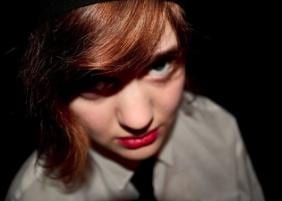Shauna Hunter Mclean never once considered going back into the closet.
But when the 17-year-old out lesbian moved to the Bulkley Valley in rural BC for her senior year of high school in September, she found herself dealing with a culture shock of sorts.
Though she had witnessed it happen to friends before, Mclean says Smithers Secondary School “is probably the first place where I’ve actually experienced homophobia personally.”
The incidents have all been verbal, she says, and she’s never been afraid of being physically attacked.
Her old public fine arts school in Langley didn’t have a gay-straight alliance (GSA) because it wasn’t really needed, she says. “Homophobia was rejected on a school-wide level.”
When she transferred to Smithers, she immediately sought out the local GSA. “It was partly because I couldn’t really let go of the privilege I had of being in such an accepting community of students. I kind of had a reaction of ‘Oh no, I’m being taken away from an open-minded community and being put into a rural Christian-like school,’” she explains.
She misses the feeling of not having to self-censor or worry about what she says in front of different people.
In a school of roughly 800 students, Smithers Secondary’s GSA has only four members — a record high number, according to Mclean.
“It’s pretty slow right now. There’s a huge pressure to stay quiet about differences.
“There’s not much we can do yet in the way of spreading awareness and acceptance,” she adds. “You know that if you put posters up, there’s going to be a certain amount torn down.”
Bulkley Valley is one of the 45 school districts in BC that don’t have a specific anti-homophobia policy. Mclean thinks a policy is sorely needed.
“Not only does it put pressure on students to realize what part they play in being bystanders or actual aggressors, it puts more pressure on teachers to realize it’s not a matter of bullying anymore; it’s a matter of discrimination,” she says.
Education activist Ryan Clayton, who attended high school in Salmon Arm, BC, believes the Ministry of Education needs to step in and create a provincewide policy specifically addressing sexual orientation and gender identity.
He says that smaller school districts often have fewer resources to develop policy and that the consistency would benefit all students, no matter where they attend school in BC.
“It would give students the confidence of looking at their agenda books and saying, ‘Okay yes, my administration is looking out for me, I’m protected. It’s in writing. It’s clear,’” he says. “It would make students feel a lot safer and protected in their schools.”
Mclean shares Clayton’s concern about the lack of resources and connections available to queer youth in Smithers and other rural areas in BC.
“I think we need a kind of straight-stretch connection, like a highway, to the same media that exists in larger cities like Vancouver,” she suggests. “The effort that is involved for [access to resources] in smaller towns is too great. There is just that barrier of communication.”
Mclean has reached out to various queer community groups from Vancouver, writing letters and asking them to send support in the form of posters and pamphlets. She also hopes to one day have Out in Schools offer workshops in her school.
Jennifer Breakspear, executive director of Qmunity, BC’s queer resource centre, concurs that there are huge areas throughout the province that are underserved and says that her organization hopes to help change that.
Qmunity currently offers PrideSpeak anti-homophobia workshops to elementary and high schools in the Lower Mainland, but Breakspear says taking those workshops on the road to the rest of BC would require more funding.
“It’s a tough situation for folks that don’t live in urban cores and live in remote communities, and we believe that it’s important that [we] reach out as best we can,” she says. “We feel that we have a responsibility to be doing this work beyond Vancouver, beyond the Lower Mainland, and to be doing it in partnership with the communities themselves, because they best know what they need.”
In the meantime, the Smithers Secondary GSA will continue to reach out to increase awareness in its community. Mclean says the group has been invited to speak about queer issues on a local radio station. She hopes that as the word gets out, more students will feel empowered to join the GSA.
“Even trying to find information about the GSA can be a daunting task,” Mclean says. “You have to put yourself out there a little bit, which is huge for a lot of these students. Even just going to a teacher and asking privately is a huge step that takes a lot of confidence.”

 Why you can trust Xtra
Why you can trust Xtra


